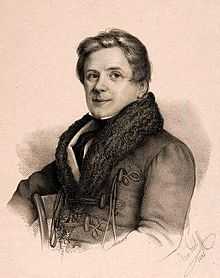Franz Hünten

- Not to be confused with the painter Franz Johann Wilhelm Hünten (1822–1887)
Franz Hünten, often billed as François Hünten (26 December 1793 – 22 February 1878), was a German pianist and composer of salon music.
He was born in Koblenz, the son of the organist Daniel Hünten, who taught Henri Herz. Like Herz he moved to Paris and entered its Conservatorium in 1819. He wrote pleasant and technically undemanding piano music: rondos, fantasies, variations, dances, etc. His first success was Variations militaires à 4 mains, op. 12, a simple imitation of Ignaz Moscheles's variations on the Alexandermarsch, and soon his popularity was such that for one work of ten pages he was paid 2000 francs.[1][2] Two years after publishing the instruction book Nouvelle méthode pour le piano-forte, op. 60 (1833), he moved back to Koblenz, where he continued to compose; he moved back to Paris after a few years but retired for good in 1848.
Hünten's music was wildly popular throughout France, Germany, and England, but critical notices inevitably described it as trifling[3] and later assessments have been much the same.[4] His son, Emil Hünten, was a painter.
Bibliography
- Gerd Zöllner: Franz Hünten. Sein Leben und Werk. Beiträge zur rheinischen Musikgeschichte 34, Köln 1959 (Diss. Köln)
External links
Notes
- ↑ Geschichte Der Musik Seit Beethoven (1800-1900). By Hugo Riemann. W Spemann, Berlin, Stuttgart, 1901. Page 313.
- ↑ Geschichte des Clavierspiels und der Clavierliteratur. By Karl Friedrich Weitzmann. J. G. Cotta, Stuttgart, 1863. Page 137.
- ↑ Allgemeiner musikalischer Anzeiger, No. 28, 14 July 1831. Hof und Haslinger, Vienna. Vol. 3, pp109-110.
- ↑ "Diverse Musicians And Psychiatrists Take On Schumann." James R. Oestreich. The New York Times, August 17, 1994.
|